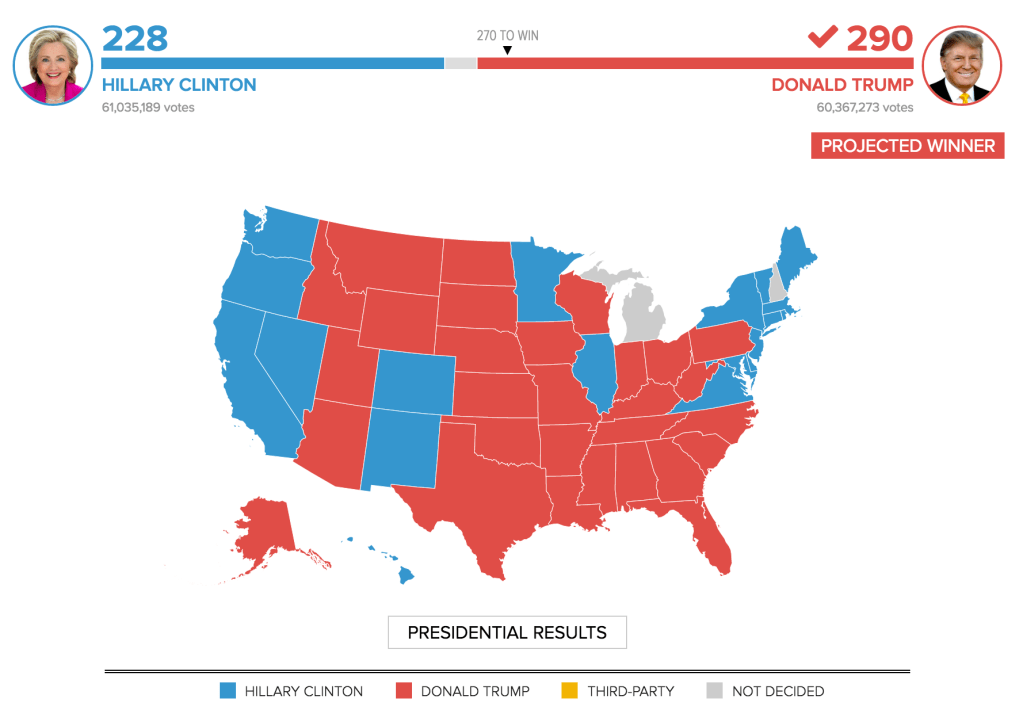Clinton didn’t play to win popular vote — she lost her electoral game
The media reports the numbers as matter of fact as they do the stock market averages — and with as little depth of description. Hillary Clinton won the popular vote, though Donald J. Trump won more than a majority of the Electoral College vote and so is president-Elect.
{mosads}As of this writing, Hillary Clinton seems to have earned about 330,000 more votes than did Donald J. Trump. Protestors are using this as a convenient foil, though one suspects they would be protesting Donald Trump’s election no matter how it was earned. Activists have begun circulating petitions to ask electors to vote for Clinton and not fulfill their pledge to vote the way their state voted.
Clinton “WON THE POPULAR VOTE” change.org thunders in all capital letters and they have gotten more than 4 million signatures in their attempt to encourage electors to be what used to be decried as “faithless.”
There is one problem with all this — That election didn’t happen!
Yes, Hillary Clinton ended up winning more raw votes than did Donald J. Trump. However, that was never the goal of either candidate or their campaigns. To trumpet that Clinton won the national popular vote is both ignorant of the campaign and irrelevant to the process now in place to move toward the inauguration of a new president on January 20.
MORE STORIES FROM THE HILL:
Trump, GOP must develop an urban agenda to stay on offense
Can the New York Times really be fair to Trump?
Now is the time to reform Congress
The 2016 campaign was fought on a battlefield where the objective was 270 electoral votes spread among the states.
The chessboard was set by the boundaries of a strongly Democrat west coast and a nearly as blue upper east coast. In between were the people spread over territory that had to be fought over, appealed to, and then earned if either side had hopes of winning the White House.
The campaign was fought in rural western Michigan and downtown Detroit. The appeals were crafted for steel workers and coal miners in Pennsylvania and soccer moms in the suburbs of New Hampshire. Hispanics in the mountain west were courted, as were black voters in North Carolina. Those were the battlegrounds and only in the fictional universe of news organizations reporting national polling results did it appear that a uniform national campaign was taking place.
It was not an effort to seek some mythical national popular vote total that drove Trump in the waning hours of the campaign to fly from Raleigh, N.C., to Scranton, Pa.., to Manchester, N.H., and then to Grand Rapids, Mich. And it wasn’t an attempt to win some kind of national mandate that encouraged Clinton to use her last few hours in places like Allendale, Mich., and Pittsburgh, Pa.
 The crucial end of the campaign was structured by the math of the Electoral College, as was the entire campaign since the conventions this summer.
The crucial end of the campaign was structured by the math of the Electoral College, as was the entire campaign since the conventions this summer.
What would a race for a national popular vote plurality look like? Well, it would have had Clinton hunkered down in Los Angeles and San Francisco, perhaps hitting Chicago and then Philadelphia on her way to New York. And it would have found Trump camped in Orange County, Calif., before storming across Texas and scrambling up through the South in an effort to maximize rural turnout.
This campaign to win the popular vote never happened.
How would it have turned out if it did? We just don’t know and can’t honestly contend that we do. What we do know is that the campaign was fought to win at least 270 electoral votes and Donald J. Trump won that election.
He will be the next president of the United States and those who want to change our system into an undifferentiated national popularity contest will have to redouble their efforts to amend the Constitution.
Until they do, the Electoral College will structure our campaigns and our choices and will continue giving us legally elected and legitimate presidents.
The views expressed by contributors are their own and not the views of The Hill.
Copyright 2023 Nexstar Media Inc. All rights reserved. This material may not be published, broadcast, rewritten, or redistributed. Regular the hill posts








